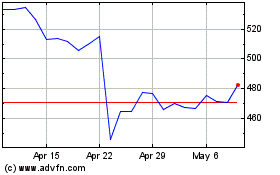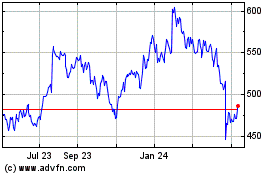By Kristin Broughton
Investors have become choosier about their portfolios,
increasingly flocking to companies that align with their values
related to the environment or social issues.
But that raises a difficult question: How can investors identify
those companies?
Fortunately, they have more tools than ever to judge companies
based on their values. Unfortunately, there are so many tools that
they may be obscuring, instead of illuminating, the path to
righteous investing.
ESG ratings firms, such as MSCI Inc. and Sustainalytics, have
long scored companies on emissions, labor policies and other
nonfinancial factors. Equity analysts and, in recent months,
credit-rating firms have also ramped up efforts to flag potentially
material environmental, social and governance risks for investors
-- aspects of products or operations that could leave companies
open to regulatory fines or damage to their reputations.
The flurry of firms attempting to grade companies on ESG
factors, and the dizzying array of techniques and methodologies
used to arrive at those scores, has led to mixed signals in the
marketplace.
"Imagine if the major ratings agencies for a corporate bond
disagreed, and one said a bond was investment grade and another
said it was high yield," says Will Kinlaw, head of State Street
Associates, the research and advisory unit of State Street Corp.
"That's where we are with ESG today. It is very hard to
navigate."
A multitude of recipes
ESG-scoring firms often rely heavily on information that
companies voluntarily disclose in annual sustainability reports,
which can be inconsistent across sectors or even within a single
company year to year. Scoring firms try to find uniformity across
industries by supplementing company reports with information
gleaned from analysts' own surveys, interviews or online sources.
From there analysts apply varying weight to factors they think are
most relevant to a given industry. Each firm has its own formula,
its own process.
The result: a lot of different results.
There are at least 200 providers of ESG ratings, ranging from
large data providers to smaller nonprofits that focus on niche
topics, such as gender pay equity, according to experts who track
ESG data.
The biggest players in the market have gained influence through
consolidation. MSCI has scooped up smaller competitors over the
past decade, including RiskMetrics and GMI Ratings. In April,
Moody's Corp. acquired a majority stake in French ESG data company
Vigeo Eiris.
S&P Global Inc., meanwhile, launched an ESG evaluation tool
in April, and State Street announced a partnership with Harvard
Business School professor George Serafeim to help clients measure
and integrate ESG performance metrics into their portfolios.
Company efforts
The increasing focus on ESG ratings, and investors' interest in
sustainable finance, also has caused companies themselves to become
more rigorous in how they track and report progress on ESG metrics.
But here, too, the wide diversity of methods for measuring ESG
performance has in some cases led to confusion -- a disconnect
between the way companies view their own behavior and the scores
they are given by others.
Take L'Oréal SA, which has invested in its corporate-ethics
division since the appointment of its first chief ethics officer in
2007. The Paris-based cosmetics company tracks its ESG scores from
several major providers, and often agrees when analysts say the
company comes up short at times, says Emmanuel Lulin, the company's
chief ethics officer.
But, Mr. Lulin says, the assessments overlook important elements
of a company's workplace environment that can be difficult to
ascertain from the outside, such as whether employees are
encouraged to speak up about harassment or other potential
misbehavior.
"It's really a work in progress. I think there is not enough
focus on the culture," he says, discussing the ESG-scoring
business. "It's more difficult to do, because it means more
investment in getting to know the company and getting to know the
people."
Investors have looked to regulators and standard-setters to
address inconsistencies in how companies disclose ESG data. A
requirement that large companies in the European Union disclose
information on social and environmental issues took effect with
their 2018 annual reports. And academics and investors last year
asked the U.S. Securities and Exchange Commission to develop a
framework for ESG disclosures.
Industry groups such as the Sustainability Accounting Standards
Board, meanwhile, have established accounting methods for companies
to follow in crafting their sustainability reports.
"There are so many players working on so many different levers
to try to get some sort of mandatory disclosure in this space,"
says Louis Coppola, co-founder and executive vice president of the
Governance and Accountability Institute, a sustainability
consulting firm. "It is something that is needed if we want real
standardized information across the board from every company, and
not just cherry-picking."
Making it work
In the end, though, despite the discord in measuring ESG
factors, reports on companies' ESG performance still provide useful
information, which is why experts recommend looking at multiple
ratings for a given company and understanding the underlying
methodologies. Following a ratings firm's analysis of a single
company over time also can provide useful insight.
Consider MSCI's ESG rating of Equifax Inc. MSCI lowered
Equifax's rating in August 2016, citing a data breach at the
company that resulted in the exposure of the personal data of
employees at Kroger Co., the supermarket chain. The following year,
in September 2017, Equifax disclosed that the personal information
of as many as 143 million consumers had been exposed.
"We can't forecast the events themselves, but there are usually
a series of indicators," says Remy Briand, MSCI's head of ESG.
Equifax declined to comment for this article.
Vladimir Demine is a portfolio manager for the international
equity team at Morgan Stanley Investment Management and head of ESG
research for the team. He views ESG scores as the first step in a
broader analysis of the nonfinancial risks that could have a big
impact on a company's bottom line. "You look at various sources of
data," he says, "and then you try to solve the puzzle."
Ms. Broughton is a Wall Street Journal reporter in New York. She
can be reached at kristin.broughton@wsj.com.
(END) Dow Jones Newswires
June 24, 2019 08:47 ET (12:47 GMT)
Copyright (c) 2019 Dow Jones & Company, Inc.
MSCI (NYSE:MSCI)
Historical Stock Chart
From Mar 2024 to Apr 2024

MSCI (NYSE:MSCI)
Historical Stock Chart
From Apr 2023 to Apr 2024
